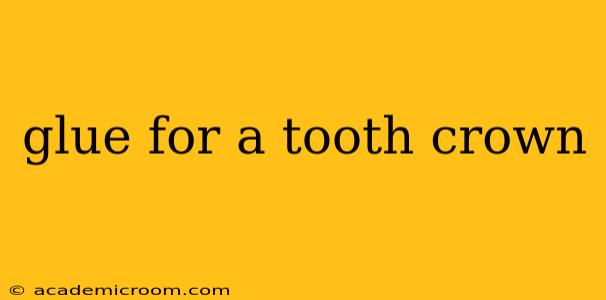Losing a crown is a frustrating experience, and the immediate reaction might be to search for a "glue for a tooth crown." However, it's crucial to understand that using household adhesives or any non-dental cement is extremely risky and can have serious consequences for your oral health. This article explores the proper methods for securing a temporary or permanent crown, dispelling myths about using everyday glues and highlighting the importance of professional dental care.
What kind of glue is used for a tooth crown?
Dental professionals use specialized cements designed for this specific purpose. These cements are biocompatible, meaning they are safe for use in the mouth, and they provide a strong, long-lasting bond. The type of cement used depends on various factors, including the type of crown (porcelain, metal, etc.) and the specific needs of the patient. There's no single "glue" – rather a range of materials with different properties. These are not available for purchase over the counter.
Can you use super glue on a tooth crown?
Absolutely not. Super glue, or cyanoacrylate adhesive, is not designed for use in the mouth. It is toxic and can cause serious health problems if ingested or absorbed into the bloodstream. Moreover, it won't provide a secure, long-lasting bond and can lead to further damage to the tooth.
Can you use denture adhesive for a tooth crown?
Denture adhesive is also unsuitable for securing a crown. While it might provide temporary adhesion, it's not designed for the precise fit and strength required for a crown. Using denture adhesive can introduce bacteria and potentially irritate the gums.
How do dentists attach a crown?
The process of attaching a crown involves meticulous preparation. First, the dentist will clean and prepare the tooth to ensure a precise fit for the crown. Then, they will select the appropriate dental cement, apply it carefully, and seat the crown into place. The cement will then harden, creating a strong and durable bond. This entire process requires specialized tools and expertise.
What to do if your crown falls off?
If your crown falls off, your first step should always be to contact your dentist immediately. Attempting to re-attach it yourself using household materials is strongly discouraged. Your dentist can assess the situation, clean the tooth and crown, and re-cement it securely, preventing potential complications. In some cases, the underlying tooth may require additional treatment.
How long does it take for dental cement to set?
The setting time for dental cement varies depending on the specific type of cement used. Some set relatively quickly, while others require a longer setting time. Your dentist will choose a cement appropriate to the situation and inform you of the setting time.
What are the risks of using household glue on a tooth crown?
The risks of using household glue are significant:
- Toxicity: Many household glues contain chemicals harmful if ingested or absorbed into the body.
- Infection: Improperly secured crowns can trap bacteria, leading to infections.
- Gum irritation: The glue can irritate the gums, leading to discomfort and potential gum disease.
- Damage to the tooth: The glue may damage the tooth structure, making it more difficult to properly restore.
- Failure of the crown: Household glues do not provide the strength and durability needed to keep the crown securely in place.
In conclusion, while the immediate impulse might be to find a quick fix, using anything other than professional dental cement to attach a crown is incredibly risky. Always prioritize contacting your dentist if your crown comes loose. Their expertise ensures a safe and effective solution to protect your oral health.
